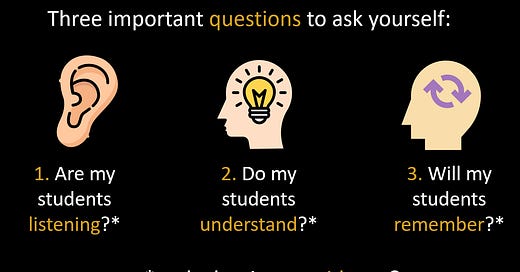The power of an imaginary coach
How you can use the Hypothesis Model to improve your own teaching
This newsletter is made possible by Eedi. As we kick off the new academic year, we're excited to introduce some fantastic new features on Eedi to make setting up your classes a breeze. We've added Google Classroom syncing (read more here) and improved Wonde syncing (read more here), making it easier than ever to get started or re-sync your existing classes. And remember, Eedi is completely FREE—switch to us and save money while simplifying your classroom setup!
Happy new school year!
For this first post, I wanted to tie together a key theme from last year’s newsletters.
I spend a lot of time coaching teachers, and I love it. Since I started using a version of Adam Boxer’s Hypothesis Model, I feel my coaching has a focused and impactful structure.
Briefly, the Hypothesis Model involves me forming a testable hypothesis about something in the lesson that is not going as well as it could be, and then gathering critical evidence to either confirm or refute that hypothesis.
If you want to read more, then check out:
This post, where I share some practical examples of the Hypothesis Model in action.
This post, where I share my lesson observation template.
Recently, I have realised that the Hypothesis Model can play an important part in lessons, even without a coach present.
Three important questions to ask yourself
Here are three questions that I think every teacher should ask at regular points in their lessons:
Let’s look at each in turn:
Are my students listening?
Following my conversation with Pritesh Raichura, I am obsessed with whether students are listening. For years, my assumption had been: of course they are! After all, I had a room full of quiet, smiling, apparently attentive students. But it was only when I started checking whether students had listened to the instructions or explanation I had just given (“Adam, what is the first step in the process that I just explained?”), I realised this was a dodgy assumption. I relied on poor proxies for listening. What is our evidence that students have listened to what we or another student just said?
Do my students understand?
Once we have established that our students are listening, the next question to ask is whether anything we or another student is saying makes sense. There are many poor proxies for understanding, such as one student's response, a room full of nods, or nobody asking questions. But what is the evidence that our students really understand?
Will my students remember?
Students have listened and understood. In the moment, everything is going great. But will they remember this tomorrow? Or next week? Or next term? We can hope they will. We can assume they will. But where is our evidence?
The imaginary coach
To help us answer these questions, we can imagine a coach in our classroom adopting the Hypothesis Model. Every time we give an instruction or explanation or another student speaks, the imaginary coach’s hypothesis is that our students are either not listening, do not understand, or will not remember. So, our job is to provide the critical evidence to test and - hopefully! - refute that hypothesis.
Are my students listening?
Our critical evidence could be Cold Calling a student and getting them to repeat back what we or another student has said. Or we could strive for mass participation by using Call and Respond. These checks for listening need to be done regularly enough, and the consequences of not listening need to be sufficiently severe, to ensure that the norm in the classroom becomes: we listen hard at all times.
Do my students understand?
Critical evidence could be in the form of Cold Calling one student, but far more reliable is a whole-class check for understanding. Mini-whiteboards are often my go-to in a maths lesson, but using ABCD cards in response to a well-chosen multiple-choice diagnostic question can be an effective way in any subject to see who understands and who does not.
Will my students remember?
The thing to avoid here is assuming that just because students could do something at the time, they will always be able to do it. This is the distinction between performance and learning. Critical evidence here is in the form of carefully considered retrieval opportunities. This could involve including questions on the topic in a future Do Now, Low-Stakes Quiz, or homework, or weaving it into an upcoming topic.
Are these valuable questions to ask when teaching?
What critical evidence could you gather?
Let me know in the comments below!
🏃🏻♂️ Before you go, have you…🏃🏻♂️
… checked out our incredible, brand-new, free resources from Eedi?
… read my latest Tips for Teachers newsletter about not letting students copy questions during the Do Now?
… listened to my most recent podcast where I chat with Ollie Lovell about a recent lesson he taught and recorded?
… considered booking some CPD, coaching, or maths departmental support?
… read my Tips for Teachers book?
Thanks so much for reading and have a great week!
Craig



